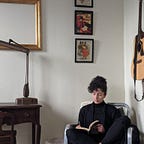Part 8: El Ingeniero con Alma de Poeta
Houston
In part due to global trading channels, my father managed to purchase the tastes of our land while living in America. In all earnestness, the cheese sold by Kroger always lacked flavor, its fruit tasted artificial and everybody’s coffee paled in comparison to our beans, proud cousins of Colombia’s. Yet in its shortcomings, America understood how to fill its voids through foreign lands.
From the Harina Pan sold by Fiesta on Interstate 10 to the tequeños prepared by Tia Gilda out of her living room, we pieced together a taste of home in that block of cement called Houston. With time, we grew fond of that sprawling, incongruous city prone to flooding. Our next door neighbors loved my mom’s Pan de Jamón, begging her to prepare it in the summer despite its strict designation to the Christmas table, and the house across the street belonged to a man from Trinidad and Tobago, an island off the shores of Venezuela.
While I succumbed to the pressures of belonging in America to secure educational success by shedding my accent and foregoing the idiosyncrasies I formed in Venezuela, my father retained his identity despite changes in the surrounding scenery.
He honked as if driving in Maracaibo. He stretched his limited vocabulary to fill hour-long conversations with anyone who would listen. Even as outdoor temperatures reached 100° Fahrenheit, he dressed as well as he always had.
Our attempts to recreate Venezuela honored our origin yet failed to fulfill that persistent longing of losing a home.
One December while I returned home from college, I heard a knock at the door only to find Mormon Missionaries standing in the doorway.
My father waved them in and served them water as they took their assigned seats, exuding a familiarity only bestowed upon frequent visitors. They talked for half an hour while I excused myself to address made-up tasks, curiously waiting around the corner to decipher whether my father’s atheism had been spoken into existence. Upon their departure, I drilled my father about the risks of engaging in conversation with missionaries visiting for grander purposes and religious intentions, failing to recognize the gift of conversation they presented to a man filled with longing.
While I managed to embed myself within the fabric of my school, my father faced blank canvases lacking a muse. His art surrendered its peaceful landscapes of kites flying above Venezuelan towns. Instead, he concocted images of huddled masses walking across fields, immigrating. He swapped lighter tones for darker hues and traded fine brushes for thicker strokes. Every so often, as he nursed a glass of rum with its ice fully melted, he lamented Venezuela’s fate in whispers to himself.
“Carajo, se lo llevaron todo”.
